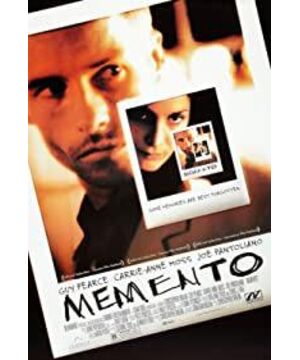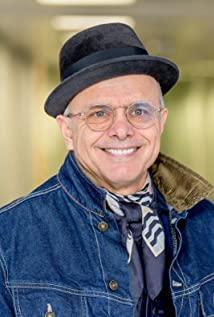Part of the inspiration for "Memento" should come from some psychological and neuroscience research on "memory".
Knowing a little about this can help us understand several key plot points of Memento.
So this article is divided into two parts, Part 1 writes the psychological inspiration of "Memento", and Part 2 interprets the plot.
PART 1: Inspiration from Psychology - Two Characteristics of Memory
In the history of research on "memory", one subject has been included in the annals of science for his rare severe amnesia. The subject's name was Henry Molaison. The general public did not know his real name until his death. In many of the papers and writings that have previously mentioned him, he is referred to as HM for the sake of privacy protection.
Born in 1926, HM suffered from epilepsy due to an accident as a child. By the time he was 27, the epilepsy was so severe that he couldn't do anything. Research has linked a part of his brain called the "hippocampus" to his seizures. After drug treatment failed completely, HM hoped to find a doctor to remove his hippocampus to cure epilepsy. It was a time when the understanding of brain function was still very shallow, but a doctor who was not afraid of medical accident (the ignorant was fearless) agreed to operate on him. He performed a craniotomy for HM and used a small tube to aspirate the hippocampus and surrounding brain tissue.
As a result of the surgery, HM's epilepsy symptoms improved significantly. But the surgery came with huge side effects: HM lost his memory of the 10 or so years before the surgery, and what's worse, he can't remember new information for more than 20 seconds since then - he can no longer form new memories. It was only later that scientists learned that the hippocampus is the brain tissue most closely related to our memory, and most of HM's memory functions were completely destroyed. His brain seemed to be permanently frozen on the day of the surgery. HM spent the rest of his life mostly in hospitals and nursing homes, introducing himself over and over again every day to doctors and nurses who had actually taken care of him for a long time.
At first, the scientists and doctors studying HM thought it was impossible for him to form any new memories, but they found that was not the case. A doctor did a small experiment on HM. He put a prank toy (joy buzzer) on the inside of his fingers that could simulate an electric shock, and then shook hands with HM every once in a while. On the first few occasions, HM didn't seem to remember shaking hands with the doctor and was "shocked" each time. But the strange thing is that after several repetitions, HM suddenly refused to shake hands - although he did not remember seeing the doctor and couldn't say the reason for the refusal.
This little experiment shows that HM has not lost all memory. Later, a large number of psychological and neuroscience studies have confirmed that human memory is actually divided into many different types. For example, memory can be divided into at least two levels. On the conscious level , patients with amnesia cannot form new memories, and on the unconscious level , patients with amnesia actually make impressions of experiences. For HM, his conscious level cannot form new memories (doesn't know the doctor), but the unconscious level remains intact, so new behavioral habits can be formed (fear of shaking hands). Later neuroscientific research found that most of these unconscious memories related to behavioral habits are related to another brain tissue, the basal ganglia. Therefore, although the HM whose "basal ganglia" remains intact cannot consciously form new memories, his body can learn various new behavioral habits.
This is the first major characteristic of memory: different types of memory are often separated, and the failure of one does not mean that the other fails .
To better understand Memento, there is another feature that we need to understand: the content of the memory is not necessarily true, and sometimes you will remember some things that you have not actually experienced .
In the 1990s, there was a very sensational case in the United States. In 1990, Erin Franklin accused her father, George Franklin, of raping and killing her friend more than two decades earlier. Irene claimed that she had witnessed her father's murder with her own eyes, and it took more than 20 years to file a complaint because the memory was too cruel, so her psychological protection mechanism suppressed this memory in the deepest part of her consciousness. It was not until she was in psychotherapy as an adult that her deepest memories were awakened. The jury fully believed Erin's testimony, and George Franklin was convicted of first-degree murder.
However, are "repressed childhood memories" really reliable? At least Freud and his followers thought so. In Freud's psychoanalytic theory, there is a very important concept called "repression". According to Freud, we may suppress painful memories in order to protect our present feelings and reduce anxiety. On the surface, we will forget these memories, but they may be retrieved because of some clues. Many therapists therefore believe that hypnosis and other suggestive therapies can restore those childhood traumatic memories. These memories, recovered in hypnosis, were once used as credible evidence in judicial trials in the United States. In addition to the bizarre case above, there have also been many strange cases in which adults suddenly recalled being abused by their parents when they were children through psychotherapy, and then filed complaints against their parents.
But later research found that the authenticity and accuracy of these "reawakened" memories were questionable. Hypnosis in psychotherapy not only fails to improve the accuracy of memory retrieval, but also leads to false memories. In fact, during hypnosis, the therapist induces the patient, consciously or not, to make it easier for them to use their own imagination to construct memories. Psychologist Schacht believes that hypnosis makes it easier than usual for people to use inner experiences as memories, and they show such great confidence in these false memories that they confuse reality and imagination. A growing number of researchers believe that so-called "repressed childhood memories" are rare if they exist.
Based on such new research evidence, the Franklin case was finally overturned in 1996. Since then, memories recovered from psychotherapy have become increasingly cautious when used as forensic evidence. After all, who can guarantee that these "recovered" memories are not the person's own imagination? Most likely they are just constructed false memories.
PART 2: The Journey of Pursuing Phantoms - Confessions of "Memento"
With the above two "theoretical foundations", I can try to interpret the plot of "Memento". I made this assumption: If Leonard, the protagonist of Memento, recovers his memory years later, how would he describe the experience in the film? The following is a confession written by me imitating the tone of the hero Leonard. Of course, what is described in it is not entirely the information directly presented by the film, and it is mixed with my analysis of the plot.
Many years later, I regained my memory. This is my confession-
My name is Leonard, and my wife likes to call me Lenny, but I don't like people calling me that too. I can still recall those good times with my wife, and although they are only fragments of memories, putting them together makes her feel like she has come back to me. The pieces are enough to make me feel how much I miss her, and enough to know how much I hate the killer who took it all away. Before that accident, I was an insurance company employee, and my job was to detect insurance fraud for the company. I'm good for the job because I'm good at spotting lies. The biggest challenge of my career came from the Sammy Jankis case. Sammy was slightly injured in a car accident, but since then he can no longer form new memories. Any experience after the car accident can only be kept in his mind for a few minutes. I know it's called "anterograde amnesia," and it's true that some patients who have had a traumatic brain injury have it, but it's extremely rare. Sammy had brain imaging tests, but found no obvious brain damage. My gut tells me that he's just a liar pretending to be sick. I started to get in touch with Sammy, but there was hardly any evidence of feigning sickness just by looking. How can I let such a skilled old fox show his flaws?
I remembered that I had seen a case report by the Swiss doctor Claparède (Note: This case report is very similar to the small experiment on HM, and there are several similar reports in history). A woman with amnesia described by Claparède was unable to recall where she spent the next five years from the date of onset, or even the name of the doctor who treated her every day. At one point, Claparède stuck a needle between his fingers, reached into the patient's hand, and stabbed her. The patient's hand retracted reflexively, but she soon forgot about it. Soon after, when Claparède's hand came close to the patient again, she found that she had retracted her hand involuntarily. When asked why, she said she didn't know, and urged her to explain that "sometimes needles are hidden in people's hands". This case gave me a lot of inspiration: human memory is divided into two levels. On the conscious level, amnesiac patients cannot form new memories, while on the unconscious level, amnesiac patients actually leave impressions of experiences. These impressions Although it cannot be directly extracted by them, it will affect their behavioral responses. That said, forgetting is sometimes detached—and Sammy Jankis doesn't necessarily understand that. I decided to send Sammy to the hospital for a test. We put several metal ornaments in front of him and asked him to pick up one of them as instructed. One of the ornaments is electrified. Sammy picked up the electrified ornament, electrocuted, furious, but he seemed to forget about it quickly. After some time, we asked him to do the same test again. If Sammy did have amnesia, he would, like Claparède's patient, refuse to pick up the electrified ornament, because his mind doesn't remember, but the impression of having been electrocuted would prevent his body from picking it up. But in fact, Sammy picked it up again, seemingly without any hesitation, got electrocuted again, and acted angry again. Sure enough, Sammy didn't know about the separation of different levels of memory, he thought forgetting was total forgetting, so he overplayed the scene. So I grabbed the fox's tail. Sammy's identity as a liar was thus revealed, and I won this battle. How could I have imagined that Sammy would become one with myself in the future?
The accident happened shortly after Sammy's case. That night, two thugs sneaked into my house, thinking my wife was the only one at home, and brutally raped her. I woke up and killed one of the gangsters, but was shot in the head by the other gangster. It was fate, presumably, that from then on myself became the person Sammy Jankis tried so hard to play - the brain damage made me a real amnesiac and I couldn't form any new memories. Although my wife recovered from this accident faster than I did, I vowed to avenge myself and my wife. The police didn't believe there was a second gangster, and they wouldn't believe the testimony of an amnesiac, even if I told them that my memory before the accident was intact. Only one cop believed me, he said his name was Teddy. He helped me with the police investigation file and gave me the opportunity to investigate the murderer myself.
I have no memory, I don't know where I am, I don't even feel the passage of time. How can I get revenge like this? Gangsters have taken away my ability to survive and I need a "system" that will keep me alive. I started getting those important clues tattooed on my body. I use the Polaroid to take pictures at any time, so that I know where I am and whether the people around me are enemies or friends. Soon my body was covered with tattoos, but I deliberately left a blank space on my left chest, and when I killed the murderer, I stabbed my victory declaration here. The revenge went far better than I expected. Teddy and I quickly found out that the killer's initials were John G., and we followed the trail to the bastard. I killed him. Filled with a sense of revenge, I pointed to my left chest and asked Teddy to take a picture of me commemorating the success of my revenge. I stabbed "I've done it" on my left chest to remind myself that my mission was over and it was time to get back to my wife.
My wife didn't believe that my memory could never be recovered, and she tried every means to make me better, like hiding all the food, forcing me to remember the location, or starving. Sadly in vain. She always hoped that I was completely psychological, always hoping that there was a way to make me recover suddenly. What she wants is not this monster without past and future, she wants the past me back to her. At that time, I didn't feel my wife getting more and more into despair. I am ignorant of time, so I cannot capture the subtle emotional changes of the people around me, even if they are my dearest and most loved ones. The wife decided to put her own life on the last bet, hoping to use my love for her to revive my memory. My wife has diabetes and I inject her with insulin every day. That day, she asked me to inject her three times, and it was a lethal dose. She thought that if I still loved her and cared about her life, I would realize something and stop. However, I was unimpressed with every previous injection. So she watched me kill her with my own hands.
After my wife died, I seemed to have no grief and no pain, because soon I could not remember that my wife had passed away. I have lived in a nursing home for a long time, the past is empty, the future has no meaning, I have become a prisoner of "now", a walking dead. But I'm not reconciled, I know that, just as Claparède's patients were afraid of needles, the past must have left something in my mind. Occasionally, the sporadic memories of my wife in the past days will appear in front of me like fragments, but what I feel in my heart is no longer warmth, but unspeakable guilt and sorrow. I know that some subconscious deep inside me actually remembers that I killed my wife myself. However, I don't want to believe it. I do not accept this cruel reality. It wasn't me, it was John G. who killed her! I'm not a freak without a past and a future, I don't want to be a lone ghost wandering the world. I want my life back. I am reminded of some other material I saw while investigating the Sammy Jankis case. Those sources tell me that not only does memory have different levels, but it can also be faked. People have many false memories. Psychologists once did such an experiment (note: this is another classic study on false memory): they asked children every week, "Do you remember the experience you lost in the mall before?" They have been lost in shopping malls, but because they have been asked this question all the time, they constructed a memory of being lost along with this question in their minds. When the psychologist asked the child again a few weeks later, the child actually "remembered" his experience of getting lost, and even described various details vividly. As long as you keep building something in your mind, it can become fake and become your memory. And for me, Sammy is the perfect material for building false memories. Subconsciously, I grafted my experience onto Sammy, and told myself this constructed imagination over and over again, making myself believe what was false. I succeeded, and then I really believed that it was Sammy who killed his wife by mistake because of amnesia, and that my wife died at the hands of John G.
Not only did this get rid of my subconscious guilt about killing my wife, but more importantly, it gave my life a new meaning. Revenge, that's what I continue to live for. I was freed from the prison of "now". I erased the "I've done it" tattoo on my chest, ripped up 12 pages of the police file that Teddy gave me, blacked out the rest, and created a mystery for myself. Pursuing this mystery has become the whole meaning of my life.
I messed with Teddy again. Although he helped me, he is not a good policeman, and stealing money is his way of survival. Teddy took it all seriously: "Aren't you looking for revenge? Well, then I'll make an enemy for you to kill." He packaged his target as John G., so that my fictional puzzle turned out to be A mystery emerged. He made a fortune and I thought I got revenge, and in a sense we were the best pairings. Teddy opened up to me after that and told me that Sammy didn't have a wife and that it was my wife who had diabetes. For a split second, the world I had worked so hard to build seemed to crumble again. What I was looking for turned out to be just a phantom that didn't exist. But no, I'm not willing to accept it. I have to believe that the world is not what I imagined, and I have to believe that what I do still has meaning, even if I don't remember what I did.
The last thing Teddy should do is tell me his real name is John Gammell. Turns out he could be a John G. too. There are too many John G.s in the world waiting for me to hunt them down, so my vision will never be shattered. And Teddy is the next first. I wrote "don't believe his lies" on the back of Teddy's picture and tattooed Teddy's license plate as a John G. feature. This can be said to be a trap set by me at that time for me later. Step by step, this trap lured me to find out the "truth" of "Teddy is John G.". Many movies love to shoot multiple personalities. In those movies, two souls can live in a person's body at the same time. Looking back now, amnesia separates me from each other at different times. The future me is actually living in a script written by me in the past. This can be said to be another kind of multiple personalities.
After Teddy died, there was the next John G., and after that, there was the next... There will always be a John G. who hasn't been killed, and my quest will never stop. So, I fell into a weird cycle. Many horror stories like to treat this reincarnation as a punishment for the guilty. But is it a punishment for me? I remember a book that said that the so-called happy life is to take into account the happiness of the present and the meaning of the future. Ironically, as someone with no memory, I live forever in the present, and the vengeance of eternal reincarnation makes my future forever meaningful. In this way, I turned out to be a happy person at that time? Yes, a broken soul, in this twisted way, found happiness. I have to confess to my wife: in those days, I frantically pursued a phantom that did not exist, but I didn't really want to avenge you, I was obsessed with the pursuit, because it made My life has meaning again. Everything I do is just for myself. That phantom that doesn't exist makes me feel like I'm still alive.
Text: Wei Zhichao
A little personal stuff, my new book published in 2020:
View more about Memento reviews











